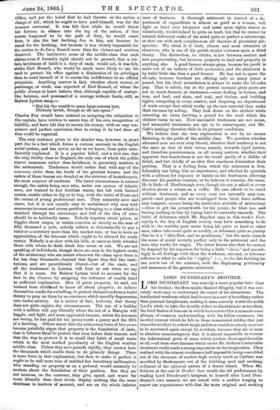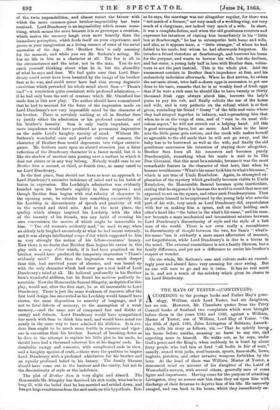LORD DUNDREARY'S BROTHER.
LORD DUNDREARY was scarcely a more popular hero than his brother, the Honourable Samuel Slingsby, but it was cer- tainly more easy to understand the secret of his attractions. The intellectual weakness which had its root in a sort of hereditary rather than personal haughtiness, making it seem scarcely worth the noble Lord's while to take the trouble either to discriminate or recollect, the brief flashes of humour in which he recovered for a moment some glimpse of common understanding with his fellow-creatures, the morbid interest which he felt in those nonsensical riddles that just rouse the intellect to ashort laugh and then vanish so utterly as never to be recovered again except by accident, because they are so near to absolute unmeaningness that it is almost impossible to recover the infinitesimal grain of sense which renders them apprehensible at 4111—all these were features which under Mr. Sothern's inimitable treatment really made a strong impression on the imagination. They realized with the utmost vividness a half impossible being—moulded out of the elements of modern high society much as Caliban was moulded by Shakespeare out of the bubbling mud and seething sediment of the physical nature of a desert island. When Mr. Sothern at the end of Brother Sam recalls his old performance by reading Lord Dundreary's telegram to himself after Lord Dun- dreary's own manner, we are seized with a sudden longing to renew our acquaintance with that far more original and striking of the twin impossibilities, and almost resent the favour with which the more common-place brother-impossibility has been received. Lord Dundreary is an impossibility which means some- thing, which means the more because it is so grotesque a creation, which makes the memory laugh even more heartily than the immediate perception, which feeds itself on your experience; and grows in your imagination as a living essence of some of the social anomalies of the day. But Brother Sam' is only amusing for the moment, and` while you see Mr. Sothetn'•s acting. He has no life in him as a character at all. The fun is all in the circumstances and the actor, not in' the man. You do not catch yourself thinking about what he is, but the absurdity of what he says and does. We feel quite sure that Lord Dun- dreary could never have been haunted-by the image of his brother Sam as he was, and could never' have had that strong dogmatic conviction which pervaded his whole mind about Sam —" Tham's niad"—a conviction quite consistent with profound admiration, — if he had only been the sort of creature which Mr. Oxenford has made him in this new play. The author should have remembered that he had to account for the force of the impression made on Lord Dundreary's not very impressible mind by the character of his brother. There is certainly nothing at all in Brother Sam to justify either his admiration or his profound conviction of his brother's insanity. Sam is only vastly impudent, and mere impudence would have produced no permanent impression on the noble Lord's haughty vacuity of mind. Without Mr. Sothern's wonderful ease and perfect culture of manner, the- character of Brother Sam would degenerate into vulgar extrava- gance. Mr. Sothern casts upon an absurd situation just a faint' reflection of the Dundreary character in a faster mould, but it is like the shadow of another man passing over a surface to which it does not cleave or in any way belong. Nbbody would care to see Brother Sam a second, or third, or fourth time, as many cared to see Lord Dundreary.
In the first place, Sam should not have so near an approach to Lord Dundreary's excessive indolence of mind and to his habit of hiatus in expression. His Lordship's admiration was evidently founded upon his brother's rapidity in these respects ; and though Brother Sam begins with real velocity of character in the opening scene, he subsides into something excessively like his Lordship in discontinuity of speech and passivity of will in the second and third acts. And in the next place, the quality which always inspired his Lordship with the idea of the insanity of his friends, was any habit of crossing his own convenience the motive of which might be inscrutable to him. " The old woman's evidently mad," he used to say, when an elderly lady laughed excessively at what he had meant seriously, and it was always intellectual coups d'etat which suggested to him so very strongly the notion of his fellow-creatures' lunacy. Now there is no doubt that Brother Sam begins: his career in this play with a coup d'etat which, if it had been practised on his brother, would have produced the temporary impression " Tham's evidently mad." But then the impression was much deeper than this, had survived years of absence, and was bound up with the only character which had ever got a real hold of Lord Dundreary's mind at all. He believed profoundly in his Brother Sam's wonderful abilities, but he found his motives perfectly in- scrutable. Now the Honourable Samuel Slingsby, as depicted in this play, would not, after the first start, be at all inscrutable to Lord Dundreary. There is just the same weakness of resource after the first bold design has miscarried as his Lordship would himself have shown, the same disposition to anarchy of language, and if not to fatal defects of memory, to the assumption of a weak memory,—and the same sort of compound fear and dislike of energy and dulness. Lord Dundreary would have sympathized too much with Sam to think him mad, and would have acted too nearly in the same way to have admired his abilities. It is evi- dent Sam ought to be much more fertile in resource and vigor- ous in execution than his brother. Instead of breaking down as he does in the attempt to explain his little plot to his uncle, he should have had a thousand coherent lies at his fingers' ends. In- domitable energy and resource, with complicated ends in view, and a haughty species of craft,—these were the qualities to inspire Lord Dundreary with a profound admiration for his brother and an equally profound belief in his lunacy. The family likeness should have come out in the hauteur and the vanity, but not in the discontinuity of style or the indolence.
The plot of Brother Sam is very slight and absurd. The Honourable Mr. Slingaby has deceived his rich uncle, who has bean long ill, with the belief that he has married and settled down, and has got largeremittaness from the said uncle on this hypothesis. But,
as he says, the marriage was not altogether regular, for there was " not much of a licence," nor very much of a wedding ring, nor very much of a clergyman, nor indeed very much of a wife. In short, it was a complete fiction, and when the old gentleman recovers and expresses-his intention of visiting him immediately in his " little
box at Scarborough," he has to extemporize both'home and wife,. and also, as it appears later, a " little stranger," of whom he had fabled to his uncle, but whom he had afterwards forgotten. He. , invades-a friend therefore at Scarborough, and borrows his house for the purpose, and wants to borrow his wife, but she declines, and her sister, a young lady half in love with Brother Sam, volun- teers to act the part instead. This: is the whole plot. And•the amusement consists in Brother Sam's impudence at first, and his melancholy indecision afterwards.; When he first arrives, he orders the servants about, tries half-a.-dozen eggs in succession to get one done to his taste, remarks that he: is so weakly fond of fresh eggs
that if he were a rich man he should like to have twenty or thirty
thousand fresh eggs always about him, borrows the lady's purse to pay his cab, and finally solicits the use of the limns and wife, and is very pathetic on the refusal which is at first given, reminding his friend " Gassy " of the bills and.vales where they had strayed together in infancy, and reproaching. him that when he is on the verge of ruin, and of " ruin in its most ridi- culous aspect," he will not stretch out a helping band. All this is good screaming farce, but no more. And when in the later acts the little game gets serious, and the mock wife makes herself so agreeable to the old uncle that he will not go away, and the baby has to be borrowed as well as the wife, and finally the old gentleman announces his intention of staying there altogether, Brother Sam loses all his resources and becomes purely Dundrearyish, remarking when his uncle is said to be like Don Giovanni, that this must be a mistake, because it was the most remarkable feature in the character of that hero, that when he became troublesome "What's his name took him to what's his name," which is not true of Uncle Rumbelow. Again, in attempted ex- planation of the mystery which gradually becomes visible to Uncle Rumbelow, the Honourable Samuel becomes quite inarticulate, stating that he supposes it is because the world is round that men are expected to act on the square, and other such Dundrearyisms. Then he permits himself to be captivated by the young lady who acts the part of his wife, very much as Lord Dundreary did, expostulates with her on making him a spoon, and on their holding each other's band like "the babes in the what's his name," and his man-, ner becomes a mere mechanical and inconsistent mixture between Lord Dundreary's discontinuity of style and the style of a fast man of the world. There is not even really a resemblance in discontinuity of thought between the two, for Sam's ". what's- his-name-"ism is evidently a mere smart affectation of manner, not forgetfulness, while Lord Dundreary's is due to a hiatus in the mind. The external resemblance is not a family likeness, but a family difference, and yet not a difference to excite his brother's respect or wonder.
On the whole, Mr. Sothern's ease and culture make an exceed- ingly poor and absurd farce very amusing for once seeing. But no one will care to go and see it twice. It has no real merit in it, and not a touch of the subtlety which gives its charm to his Lord Dundreary.































 Previous page
Previous page